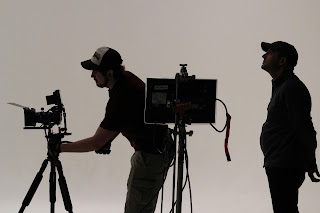 In an earlier post, I cited Helen Mirren’s take from her online Masterclass on what makes a great script and a great role. It was wonderful advice from a consummate pro, and worth reading over and over. Now that we’re going back to work (and without hazmat suits!) actors are more than ready to work as a team with other professionals to create something wonderful. The industry continues to evolve. Netflix, Paramount, Amazon, and other studios are creating series for streaming that are imaginative, big budget, and exceptionally well-done. Big stars are starting their own production companies and turning out thoughtful films with great stories. Just look at the top Oscar contenders.
In an earlier post, I cited Helen Mirren’s take from her online Masterclass on what makes a great script and a great role. It was wonderful advice from a consummate pro, and worth reading over and over. Now that we’re going back to work (and without hazmat suits!) actors are more than ready to work as a team with other professionals to create something wonderful. The industry continues to evolve. Netflix, Paramount, Amazon, and other studios are creating series for streaming that are imaginative, big budget, and exceptionally well-done. Big stars are starting their own production companies and turning out thoughtful films with great stories. Just look at the top Oscar contenders.
It’s worth remembering, however, that, unlike decades past, anything an actor appears in today will likely be posted online, including commercials, short films, and student films, so before jumping into a project, consider where you hope to go with your career, and what the impact of each role may be long-term.
The following, for example, might need a second look before committing yourself to the project.
Films/TV with an obscene word in the title: Take a hard look at this one and ask yourself if seeing that title in your list of credits would embarrass you. Also, if it sets the tone for the entire film or series.
Serious distortions of history or well-known literature, especially the historical events of a country or culture that is not your own. Examine these on a case-by-case basis. Screenwriters often alter reality to create a story. They have to, because lives are not set up as literature, and a work of fiction is typically too long to put on screen. Screenwriters can make a known work better, and often do, but if the story line really goes off the rails, see if there are balancing benefits, like the chance to expand your range with a very different type of role.
Fanning the flames of political divisions: Look past your current social circle and ask yourself if you’d be seriously alienating half of your potential audience right off the bat.
Raising awareness films: This is a trend that started with serious cultural issues (The Lost Weekend, Gentlemen’s Agreement, Guess Who’s Coming to Dinner), went on to disease films (pick your illness) and really can’t be justified at a time when information on any topic can be easily researched online. Nothing wrong with raising awareness, it’s just been done and done.
The role is a caricature/stereotype with no backstory. A film doesn’t have to include throwaway roles (watch Casablanca, where even the background actors are interesting), but for actors - early in their careers especially - this kind of role is frequently what is offered. There’s no motivation indicated for the character, they just are. The role may even be described in the audition script as “a typical ______.” If you feel you really need a credit or the money, take the audition and try to make the role interesting.
Commercials: There’s good money to be made doing commercials, but remember that because there is no credit roll at the end, commercials can come across as reality, not acting. They can impact how you are regarded for roles in other types of projects, or cast a certain light over a long and illustrious career (think Jane Powell and June Allyson, big stars of the 1940s/1950s who became known for commercials promoting eldercare products). Fit, glamorous, sophisticated, clever, funny? Go with it.
Extraneous dialog intended to stretch a 45-minute plot into an hour and a half. Read the full script. You’ll spot it. If your character has a few good scenes and you’re likely to get a usable clip, it may still be worth your time.
Last, and probably most important, you wouldn’t want your children/parents/significant other to ever see you in it: From time to time we see trends in films where certain elements are added simply because the director CAN and not because it makes for a better film or furthers the plot. This was especially notable from the late 1960s into the 1980s when directors got carried away with obscene dialog, bathed the screen in blood spatter, explored degraded lifestyles, etc. Actors happily went along, because it felt arty, or at least naughty.
Okay, we get it. But it’s rather hard to be naughty these days. It’s all out there.
No comments:
Post a Comment
I will get back to you shortly!